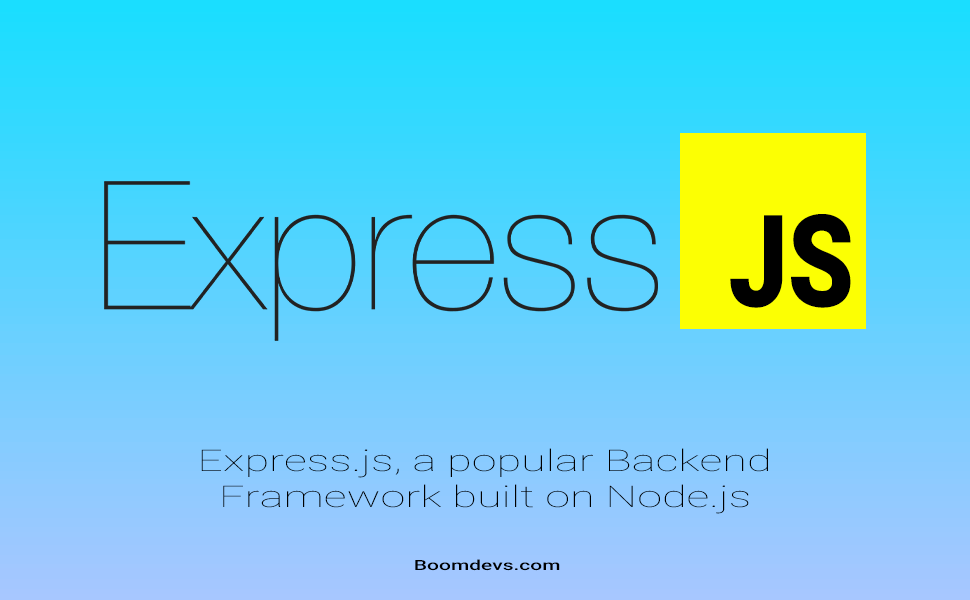Express.js is a popular backend framework built on Node.js. It simplifies server-side development with its lightweight and flexible structure. Many developers ask, is Express JS frontend or backend? The answer is backend, as it handles APIs, routes, and server logic efficiently. Next, we’ll explore everything you need to know about Express.js and its features. Express js is one of the fastest programming languages for web development.
Related: Best Language for Backend Web Development
What is Express.js?

Express.js is a fast and minimal backend framework built on Node.js. It provides tools to create web applications and APIs with ease. Its simplicity makes it a top choice for developers. Want to learn about the Web and Apps development services of Boomdevs?
With Express js, you can handle HTTP requests, set up routing, and manage middleware efficiently. It is highly flexible, allowing you to build small apps or large, scalable systems. Developers also use it to serve static files like images or CSS. Speaking of backend language, do you have enough knowledge about SQL?
Moreover, Express.js works seamlessly with databases like MongoDB and MySQL. It powers the backend for modern web and mobile applications. This makes it a go-to framework for dynamic server-side development.
Explore more about the Best Javascript Backend Frameworks for Scalable Solutions.
Key Features of Express.js
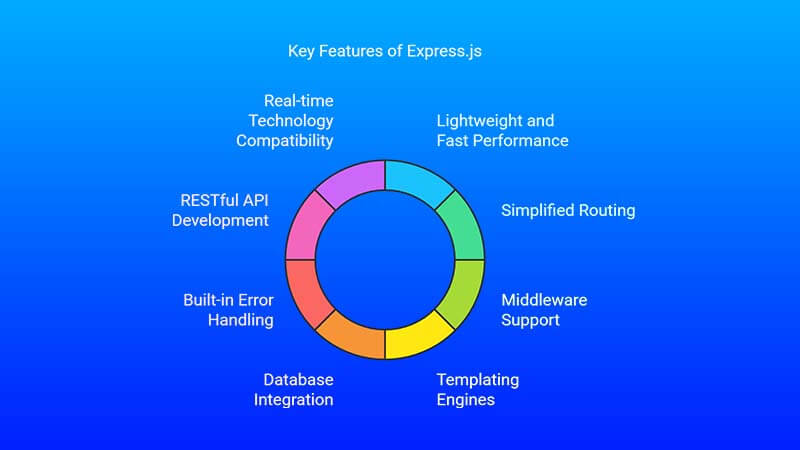
Express.js stands out for its versatility and simplicity in backend development. It offers a range of features that make building web applications and APIs more efficient. Here are the key features of Express.js:
- Lightweight and fast performance
- Simplified routing for HTTP requests
- Middleware support for request and response handling
- Templating engines for dynamic content
- Seamless integration with databases
- Built-in error handling mechanisms
- Support for RESTful API development
- Compatibility with real-time technologies like WebSocket
- Ability to serve static files like HTML, CSS, and JavaScript
Learn how to choose the best backend language.
How Express.js Works: The Request-Response Cycle Explained
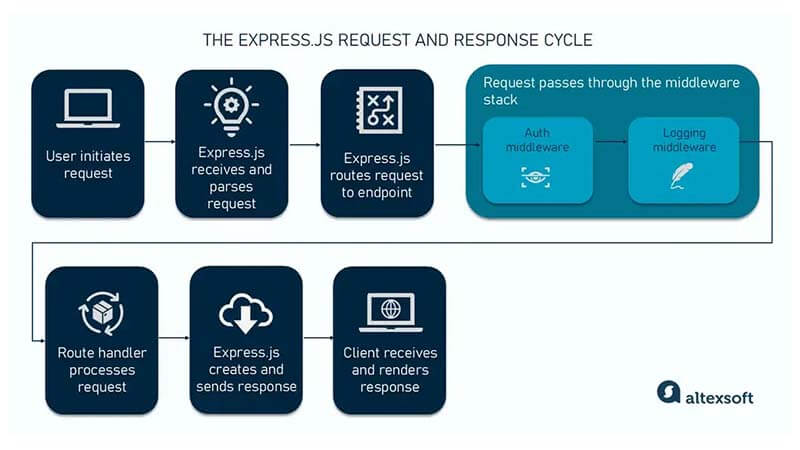
To understand Express.js, let’s break down its core components.
- Middleware: These are functions that run during the request-response cycle. They perform tasks like user authentication or logging before passing control to the next function or sending a response.
- Routing System: Express.js defines how the app responds to client requests based on URLs and HTTP methods (GET, POST, etc.). Routes can be static (e.g., /home) or dynamic (e.g., /blog/:id).
- Route Handlers: These functions handle requests at specific routes. They process data and send responses using the req (request) and res (response) objects.
Request-Response Cycle Example
- User Request: The user submits a login form, sending an HTTP POST request to /login.
- Request Parsing: Express.js parses the request, identifying the method (POST) and the data (username and password).
- Routing: Express.js routes the request to the appropriate handler for /login.
- Middleware Processing: The request passes through middleware (e.g., validation, logging) for additional processing.
- Route Handler: The handler checks the database for valid credentials and fetches user data if successful.
- Response Creation: Express.js constructs a response, including a status code, headers, and data (e.g., JSON or HTML).
- Client Response: The browser processes the response and displays the appropriate data to the user.
This cycle ensures that requests are handled efficiently, with middleware, routing, and handlers working together to deliver a response.
Explore more about JavaScript Frameworks vs Libraries.
However, besides the backend, if you want to know about the frontend, you can click here to learn the best frontend language for web development.
Is Express.js a Framework?
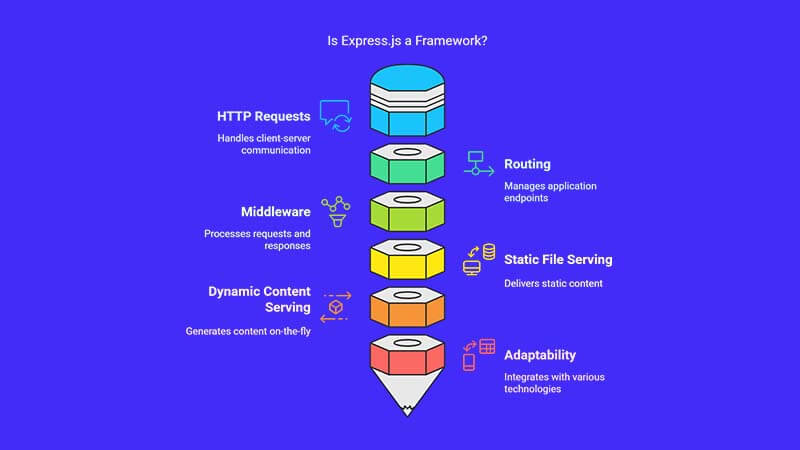
Yes, Express.js is a framework specifically designed for backend development. Built on top of Node.js, it simplifies creating web applications and APIs. Its lightweight structure and flexible features make it highly popular among developers.
Express.js provides tools to handle HTTP requests, routing, and middleware efficiently. It acts as a foundation, allowing developers to build server-side applications without starting from scratch. This makes it faster and more efficient to develop robust systems.
While Express.js is primarily used for backend tasks, it can also serve static files and dynamic content. Its adaptability ensures it works well with various technologies, such as databases and frontend frameworks. This versatility is why it’s a top choice for backend development.
Want to know more about 10 Most In-demand Backend Frameworks?
Is Express JS frontend or backend?
Express.js is a backend framework designed to handle server-side operations and API development. It works with Node.js to manage requests, process data, and send responses to the client. This makes it an essential tool for building dynamic web applications. Read more about API Gateway.
One of its core functions is handling HTTP requests and routing. Express.js maps URLs to specific functions, allowing developers to create RESTful APIs and web services. It also supports middleware, which helps with tasks like user authentication, data validation, and error handling.
Additionally, Express.js integrates seamlessly with databases like MongoDB, MySQL, and PostgreSQL. It processes backend logic efficiently, ensuring smooth communication between the server and database. These features make Express.js a powerful choice for scalable and secure backend development. Why don’t you take a look at Is React a Front-End Framework?
Can Express.js Be Used for Frontend?
Express.js is primarily a backend framework, but it has some limited frontend capabilities. It is designed to handle server-side logic, API development, and database interactions. However, it can serve static files like HTML, CSS, and JavaScript.
Although Express.js can deliver frontend content, it does not provide tools for building user interfaces. Frontend frameworks like React, Angular, and Vue.js are better suited for creating dynamic and interactive UI components. This is where how express.js works with frontend frameworks becomes important in modern web development. Learn more about Python vs Java for Web Development.
For a complete web application, developers often use Express.js as the backend and a frontend framework for the user interface. This combination ensures a seamless connection between the client and server, making applications fast and efficient.
Read more: Is Django a Front-End Framework?
Advantages and Disadvantages of Express.js
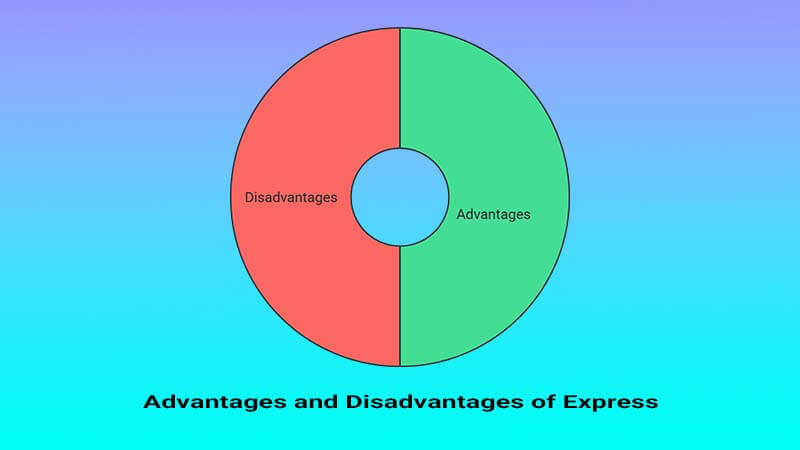
Express.js is a powerful backend framework that simplifies web application development. It offers flexibility, speed, and seamless integration with various technologies. However, like any framework, it has both advantages and disadvantages.
| Advantages | Disadvantages |
| Lightweight and fast performance | Lacks built-in security features |
| Easy to learn and use | Requires manual error handling |
| Simplified routing system | Not ideal for large monolithic apps |
| Supports middleware for customization | Can become complex with too many dependencies |
| Works well with RESTful APIs | No strict structure for project organization |
| Seamless integration with databases | |
| Flexible and scalable for small to large applications | |
| Rich ecosystem with numerous third-party modules | |
| Works efficiently with real-time applications |
Is Express.js a Good Idea for Backend?
Yes, Express.js is an excellent choice for backend development. It is lightweight, fast, and highly flexible, making it ideal for building web applications, RESTful APIs, and real-time applications. Its minimalistic design allows developers to create scalable and efficient backend systems with ease.
Express.js offers a simplified routing system, middleware support, and seamless integration with databases like MongoDB and MySQL. It also works well with frontend frameworks, ensuring smooth data flow between the client and server. These features make it a preferred backend framework for many developers.
However, like any technology, it has some limitations. It requires manual handling of security, error management, and project structuring. But with proper implementation, Express.js remains one of the best choices for modern backend development.
You can learn more about Django, Python, React, Node.js, and so on.
Should I Learn Express.js for Backend Development?
Yes, learning Express.js for backend development is a great choice, whether you’re a beginner or a professional. It is widely used, easy to learn, and highly efficient for building web applications and APIs. But the decision depends on your skill level and career goals.
For Beginners:
- Express.js has a simple and minimalistic structure, making it beginner-friendly.
- It helps you understand server-side programming, routing, and API development.
- Learning Express.js is a great way to start with Node.js backend development.
For Professionals:
- Express.js is highly flexible and scalable, suitable for complex applications.
- It allows for custom middleware and advanced API handling, making it powerful for large projects.
- Many top companies use Express.js, so mastering it boosts career opportunities.
Whether you’re just starting or already experienced, Express.js is a must-learn framework for efficient and scalable backend development.
Get more information from Node JS Backend Frameworks: Build Smarter Applications.
Build a Powerful Backend with Express.js – BoomDevs Can Help!
Are you looking for a fast, scalable, and efficient backend for your web application? At BoomDevs, we specialize in custom Express.js backend development to ensure seamless performance, security, and scalability.
Want to hire dedicated and skilled developers?
Whether you need a RESTful API, real-time application, or a fully optimized server-side solution, our expert developers are ready to bring your ideas to life. Don’t let backend complexities slow you down!
🔹 Custom Express.js Development
🔹 High-Performance API Solutions
🔹 Secure & Scalable Backend Architecture
👉 Let’s build something amazing together! Contact BoomDevs today!
Contact BoomDevs Today!
Get a quote.
Frequently Asked Questions:
Q1: Why is Express.js so popular for backend development?
Express.js is popular because of its lightweight, flexible, and minimalist structure. It simplifies backend development by providing easy routing, middleware support, and seamless API handling. Developers prefer it because it allows them to build fast and scalable web applications with minimal effort.
Q2: How does Express.js improve the performance of web applications?
Express.js improves performance by handling multiple requests asynchronously using the non-blocking nature of Node.js. It also optimizes request processing through middleware functions, reducing server load and response time. Learn more.
Q3: Can Express.js be used for microservices architecture?
Yes, Express.js is an excellent choice for microservices architecture. Its lightweight nature and modular approach make it easy to build independent, scalable services. It also works well with Docker, Kubernetes, and cloud-based platforms.
Q4: What are the security best practices for Express.js applications?
To secure an Express.js application, follow these best practices:
- Use Helmet.js to set security-related HTTP headers.
- Sanitize and validate user inputs to prevent SQL injection and XSS attacks.
- Implement authentication and authorization using JWT or OAuth.
- Use HTTPS and secure cookies to protect data transmission.
Q5: How does Express.js handle database interactions?
Express.js works seamlessly with databases using ORMs (like Sequelize for SQL databases) or ODMs (like Mongoose for MongoDB). It enables developers to perform CRUD operations, manage connections, and handle data efficiently through database drivers and query builders.
Q6: What is the difference between Express.js and Koa.js?
Express.js and Koa.js are both Node.js frameworks, but Express.js is feature-rich and widely used, while Koa.js is lighter and modular. Express.js includes built-in middleware and routing, whereas Koa.js requires developers to add middleware manually, offering more flexibility but requiring extra setup. Learn more from Reddit.
Q7: Is Express.js suitable for enterprise-level applications?
Yes, Express.js is suitable for enterprise-level applications when combined with scalable architecture, caching mechanisms, and proper security measures. Large companies use Express.js for high-traffic applications, API services, and microservices because of its efficiency and flexibility.
Wrapping Up:
Express.js is a powerful and flexible backend framework that simplifies web application development. It efficiently handles server-side logic, API creation, and database interactions, making it a top choice for developers. If you’re wondering if is Express JS backend or frontend?—it is primarily a backend framework designed to manage data and server operations. With its speed, scalability, and ease of use, Express.js remains a top choice for modern web development.



